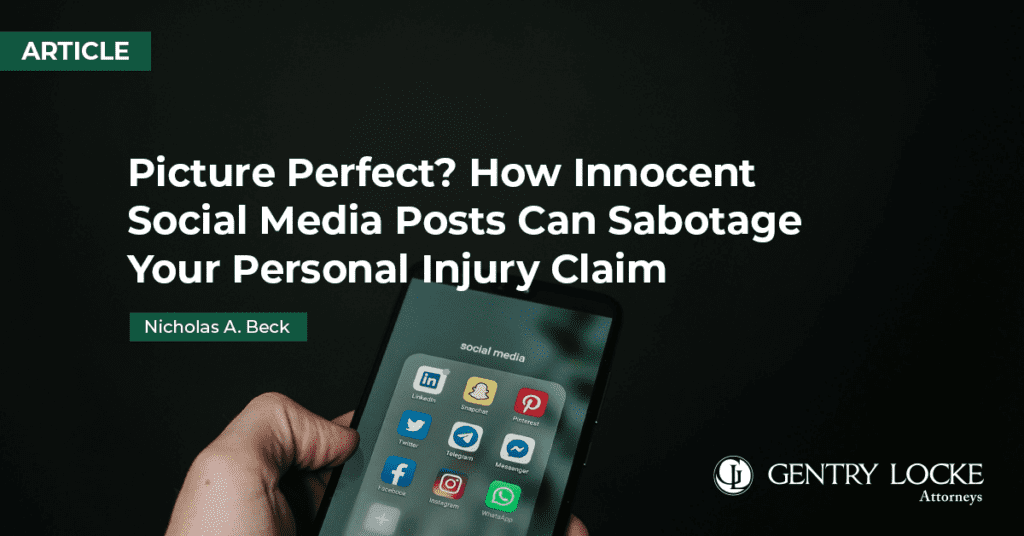Picture Perfect? How Innocent Social Media Posts Can Sabotage Your Personal Injury Claim

There’s no doubt that social media has changed our daily lives – for the better and for the worse. We post important life updates, photos from joyous occasions, and even videos of the latest dance trend. Sure, when you’re only being “followed” by friends, family, and colleagues, these posts are relatively harmless. But when you’re pursuing personal injury attorneys in Virginia, you should think twice whether or not to hit that “Post” button.
When you file a personal injury claim, you’re inviting the defendant or defendants to scour and scrutinize every post from that moment forward. As the plaintiff, you’re essentially saying, “I was injured by the defendant, and those injuries have affected my life in some negative way.” Social media gives the defendant, defense counsel, and insurance companies an opportunity to find any statement, photo, video, or even location “check-in” to prove that your injury is not as bad as you claim.
Common Social Media Misconceptions
Many people incorrectly assume that their social media cannot be used them for a variety of reasons and post anyway. We’re here to let you know common misconceptions about personal injury plaintiffs and why we tell our clients not to post on social media when we take on their personal injury lawsuits.
1) “Private” doesn’t always mean private.
Social media posts are not legally protected documents and are subject to discovery. If defense attorneys and insurance adjusters are unsuccessful in their numerous tactics to retrieve information from your private social media accounts, they can (and likely will) use discovery to gain access to your social media posts (and posts of you shared by others).
2) “I can just delete any post that’s hurtful to my case.”
As the common saying goes: “Once it’s on the internet, it’s there forever.” This saying isn’t just something adults tell teenagers to encourage responsible internet use. There are many tools lawyers, insurance companies, and private investigators can use to access historical data online. So when you delete a post, it may be gone from the current version of your social media account, but it’s not deleted from the history of your account.
If anything, deleting a potentially damaging post can actually do more harm to your case than good. It can create doubt in a juror’s mind as to whether you’re a credible plaintiff by making you look like you’re attempting to hide something even if you’re not.
3) Context isn’t necessary to use social media posts against you.
Often, clients will post photos of themselves and others in places and situations that would otherwise be normal content to share. The issue becomes how those same posts can be used against you in your personal injury lawsuit.
For example, if a plaintiff makes a claim that they’re having difficulty walking due to pain from an injury caused by medical malpractice and later posts a photo from dinner standing next to friends, the defense can use that photo as evidence that the plaintiff’s injury isn’t as significant as he claims it to be. It does not matter whether the plaintiff was in excruciating pain during the time or whether he used crutches except for the split second the photo was taken. The defense is likely to put up the photo for a jury and ask, “Mr. Smith, is this you standing in this photo taken last month smiling at Olive Garden?” If the defense attorney is experienced, he won’t allow the plaintiff any opportunity to explain the circumstances, and the jury will be left wondering whether the plaintiff’s injuries and pain and suffering are as bad as he claims them to be.
Context does not matter.
At Gentry Locke, our team of experienced personal injury attorneys will help you navigate your lawsuit in the modern day of social media. We advise and remind all of our clients not to delete previous posts, not to post anything related to their cases, and, when in doubt, not to post at all. Our attorneys are familiar with the various tactics used by defense counsel and insurance companies to downplay serious injuries and the effect they can have on the value of the case. Contact us today for guidance on your case.





